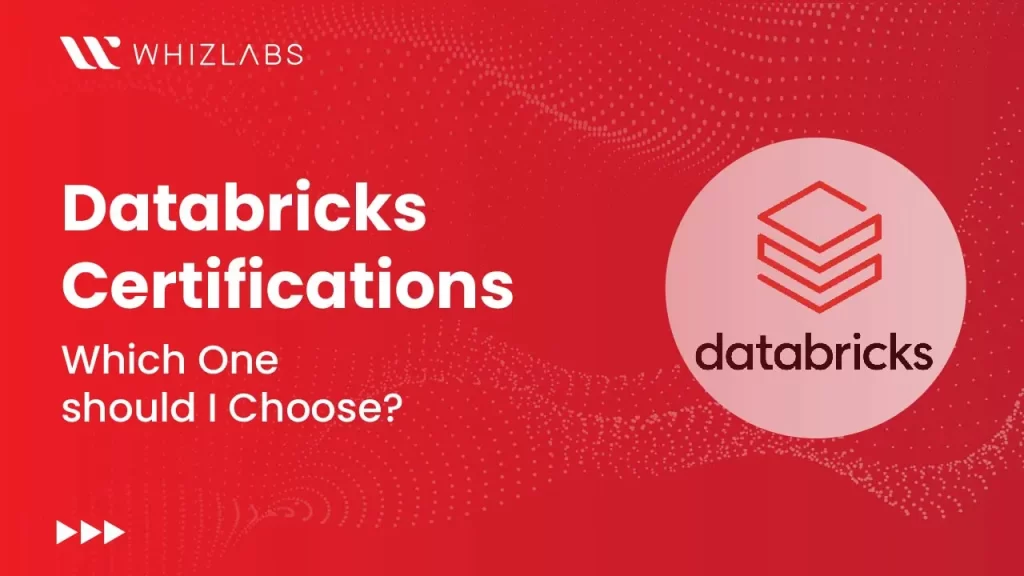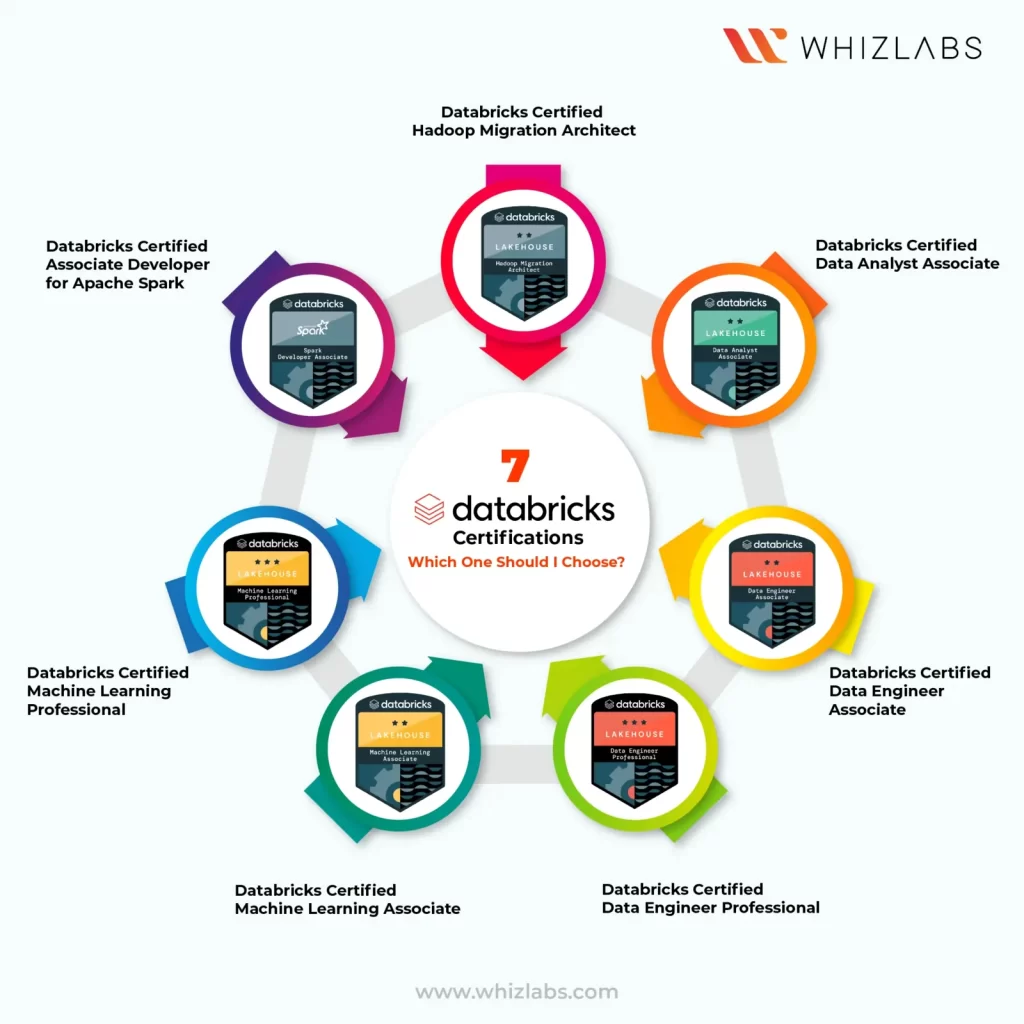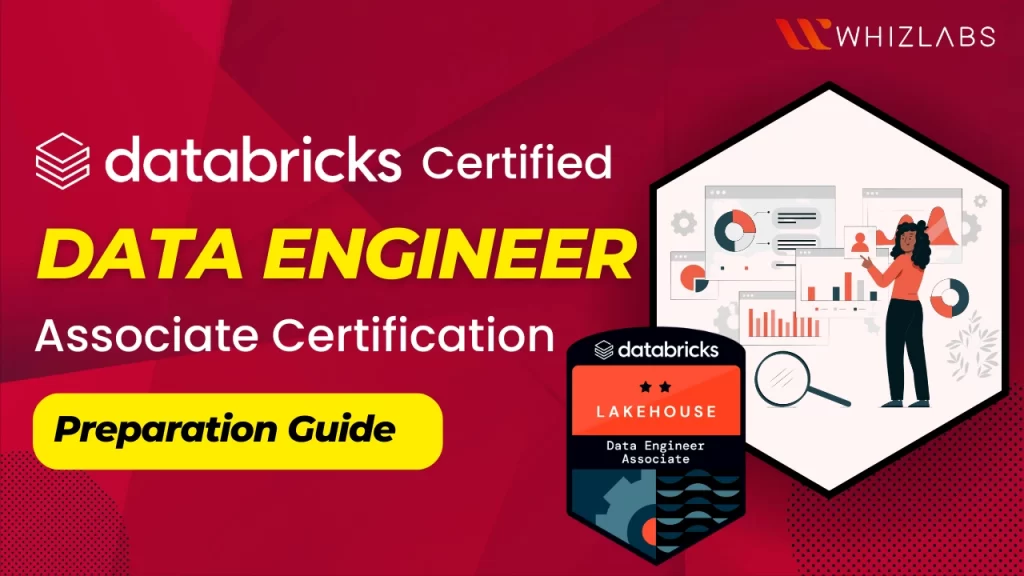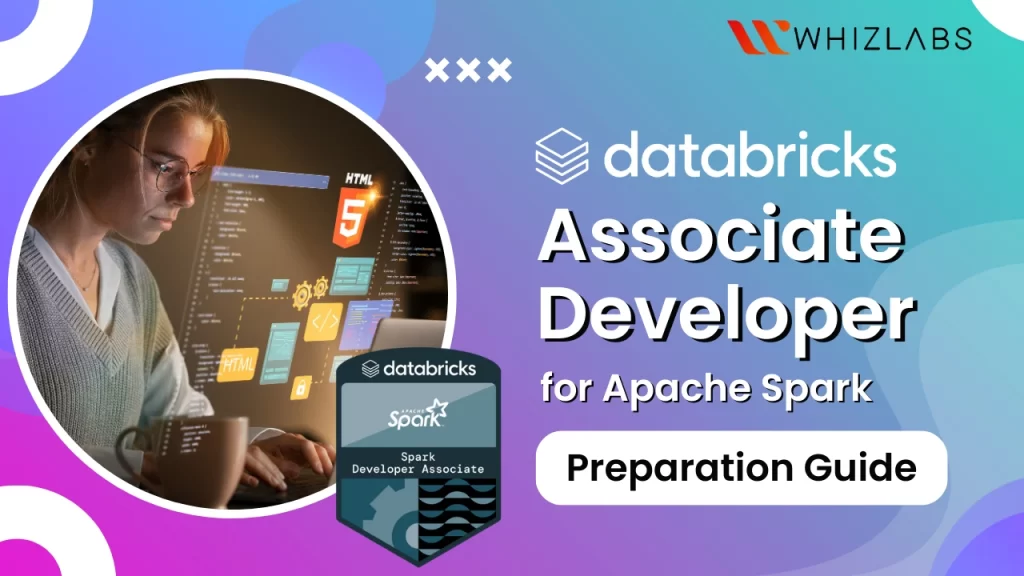The realm of data and AI technologies is witnessing exponential growth, making the demand for skilled professionals more prominent than ever.
Among the plethora of certifications available, Databricks certifications emerge as a beacon for those seeking to validate their expertise in data engineering, data analysis, machine learning, and more on the Databricks platform.
If you’re navigating through the options and wondering which Databricks certification is best for you. Let’s explore the paths, costs, and benefits to aid in your decision-making process.
What is Databricks?
Databricks unifies data engineering, science, analytics, and machine learning on a single platform, facilitating innovation and simplifying the data to AI journey. Its certification program is designed to endorse professionals for their practical skills in specific areas, paving the way for career advancement and recognition in the field.
In the dynamic and rapidly evolving field of data and artificial intelligence, professionals continuously seek to validate their skills and knowledge through certifications.
Databricks, as a leader in this space, offers a comprehensive suite of certifications catering to various roles within the data and AI landscape.
Whether you’re an analyst, data engineer, machine learning specialist, or developer, there’s a Databricks certification that aligns with your career aspirations and expertise level.
Databricks Certifications List
For Analysts and Data Enthusiasts
1. Databricks Certified Data Analyst Associate
Beginning Your Journey as a Data Engineer
2. Databricks Certified Data Engineer Associate
3. Databricks Certified Data Engineer Professional
For Machine Learning Experts
4. Databricks Certified Machine Learning Associate
5. Databricks Certified Machine Learning Professional
Spark Developers and Hadoop Migrators
6. Databricks Certified Associate Developer for Apache Spark
7. Databricks Certified Hadoop Migration Architect
Let’s delve into the seven Databricks certifications available and guide you on choosing the one that’s right for you based on your role or focus areas.
For Analysts and Data Enthusiasts
1. Databricks Certified Data Analyst Associate
This certification is ideal for professionals who utilize Databricks for data analysis. It validates your ability to manage data, create data visualizations and dashboards, and develop analytics applications using Databricks SQL.
If your role involves introductory data analysis tasks and you have at least 6 months of hands-on experience in this area, this certification could be the right fit for you.
Know More : Databricks Certified Data Analyst Associate certification preparation guide
The exam content is distributed across five domains, with percentages indicating the focus on each area:
- Databricks SQL – 22%
- Data Management – 20%
- SQL – 29%
- Data Visualization and Dashboards – 18%
- Analytics Applications – 11%
Beginning Your Journey as a Data Engineer
2. Databricks Certified Data Engineer Associate
Designed for those who build and maintain data pipelines within the Databricks environment, this certification demonstrates your understanding of the Lakehouse Platform, Apache Spark™ SQL, Python, and the best practices for data governance.
If you’re starting your journey as a data engineer, this certification, with its focus on basic data engineering tasks, is an excellent starting point.
Know More : Databricks Certified Data Engineer Associate Study Guide
Content Distribution: The exam focuses on several key domains, each contributing to the overall assessment:
- Databricks Lakehouse Platform – 24%
- ETL with Spark SQL and Python – 29%
- Incremental Data Processing – 22%
- Production Pipelines – 16%
- Data Governance – 9%
3. Databricks Certified Data Engineer Professional
For experienced data engineers, this professional-level certification assesses advanced skills in data engineering, including the use of Databricks’ developer tools, data modeling, and ensuring the security and reliability of data pipelines.
With a recommended experience of over a year, this certification is suitable if you’re looking to validate your expertise in handling complex data workflows on Databricks.
Know More : Databricks Certified Data Engineer Professional Certification Guide
Content Distribution: The exam tests knowledge across several domains, each critical to the role of a data engineer working at an advanced level:
- Databricks Tooling – 20%
- Data Processing – 30%
- Data Modeling – 20%
- Security and Governance – 10%
- Monitoring and Logging – 10%
- Testing and Deployment – 10%
For Machine Learning Experts
4. Databricks Certified Machine Learning Associate
This certification is tailored for individuals starting their journey in machine learning projects on Databricks. It covers the basics of Databricks Machine Learning, including AutoML, Feature Store, and aspects of MLflow, as well as Spark ML for implementing machine learning workflows.
If you have a foundational understanding of machine learning and wish to specialize further, consider this certification.
Know More : Databricks Certified Machine Learning Associate Guide
Content Distribution: The certification exam focuses on four primary domains, reflecting the critical components of machine learning projects:
- Databricks Machine Learning – 29%
- ML Workflows – 29%
- Spark ML – 33%
- Scaling ML Models – 9%
5. Databricks Certified Machine Learning Professional
Advanced practitioners in machine learning can aim for this professional certification, which dives into deploying machine learning models in production, managing the machine learning lifecycle, and building monitoring solutions for data drift.
With a requirement of more than a year of hands-on experience, this certification is aimed at those deeply involved in machine learning engineering tasks using Databricks Machine Learning.
Content Distribution: The exam content is structured to reflect the critical areas of knowledge and skill in machine learning, with a focus on practical and advanced tasks:
- Experimentation – 30%
- Model Lifecycle Management – 30%
- Model Deployment – 25%
- Solution and Data Monitoring – 15%
Spark Developers and Hadoop Migrators
6. Databricks Certified Associate Developer for Apache Spark
If your role revolves around using Apache Spark for building and optimizing data processing tasks, this certification is for you. It assesses your understanding of the Spark architecture and your ability to apply the Spark DataFrame API for data manipulation tasks.
Both Python and Scala developers can pursue this certification, making it ideal for developers focused on Spark-based applications.
Know More : Databricks Certified Associate Developer certification preparation guide
Content Distribution: The exam content focuses on several key areas:
- Apache Spark Architecture Concepts – 17%
- Apache Spark Architecture Applications – 11%
- Apache Spark DataFrame API Applications – 72%
7. Databricks Certified Hadoop Migration Architect
Specialized for architects and engineers involved in migrating Hadoop workloads to the Databricks Lakehouse, this certification validates your ability to architect migrations, including data and code migration, and executing final cutover steps.
This certification is targeted at those with experience in legacy Hadoop systems and seeking to demonstrate their competency in transitioning to more modern data platforms.
The certification exam is structured around key knowledge areas essential for successful Hadoop to Databricks migrations:
- Platform Concepts – 31%
- Data Migration – 29%
- Code Migration – 33%
- Cutover – 7%
Choosing the right Databricks certification depends on your current role, career aspirations, and the technologies you want to master. Each certification is designed to validate specific skill sets within the Databricks ecosystem, from data analysis and engineering to machine learning and Apache Spark development.
By selecting a certification that aligns with your professional background and future goals, you embark on a path of learning and career advancement, ensuring that you remain at the forefront of data and AI technologies.
How to Prepare for Databricks Certification?
Preparation involves a combination of studying Databricks’ official resources, practical experience, and possibly attending training courses. The key is to approach the exam with a solid understanding of the concepts and hands-on experience.
For those new to the field, the Associate certifications provide an excellent starting point, offering a foundation from which to advance to more specialized or higher-level certifications.
- Understanding the Exam Framework Exam Content Areas: Familiarize yourself with the specific content areas covered in the Associate exam you’re interested in. For example, Data Analyst Associate covers Databricks SQL, Data Management, and Data Visualization among others. Each area contributes a certain percentage to the exam.
- Gain Hands-on Experience: Aim for at least 6 months of practical experience with the Databricks platform, focusing on the skills outlined in the exam guide. For Data Analyst and Data Engineer Associate exams, this includes working with SQL and Python for data manipulation, visualization, and basic ETL tasks.
- Engage in Training Courses: Data Analysis with Databricks SQL and Data Engineering With Databricks are recommended courses, take these courses and practice. These courses are designed to cover the foundational knowledge and skills needed for the exams.
- Review Technical Requirements for Online Exams: Understand the requirements for taking an online proctored exam, including the system check. This ensures you can take your exam without technical interruptions.
- Identify and Bridge Knowledge Gaps: After engaging with the training material and based on your practical experience, identify any areas where you’re lacking. Use additional resources, such as Databricks documentation, online tutorials, or community forums to strengthen these areas.
- Practice with Sample Questions/Exams: If available, practice with sample questions or exams to get a feel for the question format and to test your readiness. This will also help you manage time effectively during the actual exam.
- Recertification Plan for recertification: Since Associate certifications are valid for two years. Staying current with the platform will help you maintain your certification status.
Additional Preparation Tips
- SQL and Python Proficiency: Given the reliance on SQL and Python across Databricks certifications, ensure you’re comfortable with these languages, especially for data manipulation tasks.
- Hands-on Practice: Use the Databricks platform to practice real-world tasks. Creating data visualizations, dashboards, and basic ETL pipelines will be beneficial.
- Community and Support: Leverage the Databricks community forums and support channels if you encounter difficulties or have questions during your preparation.
FAQs
How do I choose the right Databricks certification for my career?
- Identify Your Career Goals: First, understand your career objectives. Are you looking to specialize in data engineering, data science, machine learning, or a specific industry application? Databricks offers certifications tailored to different professional roles and skills.
- Assess Your Current Skill Level: Evaluate your existing skills and experience with Spark, Python, Scala, SQL, machine learning, and data analytics. Choose a certification that matches your skill level, whether you’re a beginner or have advanced knowledge.
- Research Certification Paths: Databricks provides several certification paths. For instance, if you’re interested in data engineering, look for certifications focusing on Spark and data pipelines. For data scientists, certifications that emphasize machine learning and analytics are more relevant.
What are the costs associated with Databricks certifications?
The costs of Databricks certifications can vary depending on the specific certification and any promotional offers available. Generally, the price is 200$. It’s best to check the official Databricks website for the most current pricing information.
How do Databricks certifications compare to other big data and cloud certifications?
- Focus on Apache Spark and Unified Analytics Platform: Databricks certifications are uniquely positioned with a strong emphasis on Apache Spark and Databricks’ Unified Analytics Platform, offering deep expertise in these areas compared to more general big data or cloud certifications.
- Industry Recognition: Databricks certifications are highly regarded in industries utilizing big data and analytics. They might not cover the breadth of cloud services like AWS, Azure, or Google Cloud certifications but are highly valued for roles requiring Spark and data analytics expertise.
- Complementarity: Many professionals find value in combining Databricks certifications with other cloud provider certifications to broaden their skill set and appeal to a wider range of employers.
Are there entry-level Databricks certifications suitable for beginners?
Yes, Databricks offers certifications that are suitable for beginners, focusing on fundamental concepts of Spark and basic data processing tasks. These entry-level certifications are a good starting point for those new to big data and aim to build a solid foundation before advancing to more specialized certifications.
What resources are recommended for preparing for Databricks certifications?
- Official Databricks Training: Databricks offers official training courses and materials that are directly aligned with their certifications. These include online courses, instructor-led training, and hands-on labs.
- Practice Exams: Taking practice exams can help you gauge your readiness and familiarize yourself with the format of the certification exam.
- Community and Forums: Engaging with the Databricks community, forums, and attending meetups or webinars can provide additional insights and tips from those who have already gone through the certification process.
Are Databricks certifications worth the investment?
- Career Advancement: Databricks certifications can significantly enhance your resume by demonstrating your expertise in high-demand skills related to big data processing, analytics, and machine learning.
- Recognition: Achieving a Databricks certification provides industry recognition of your skills, which can be beneficial for job opportunities, promotions, and salary negotiations.
- Learning and Development: The process of preparing for and achieving certification can significantly deepen your knowledge and skills in using Databricks and Apache Spark, making it a valuable learning experience.
Conclusion
Diving into the world of Databricks certifications opens up a realm of opportunities for professionals looking to establish or elevate their careers in data and AI.
With a clear understanding of each certification’s focus area, you’re well-equipped to select the one that aligns with your career objectives and embark on a journey of learning and professional growth.
- 7 Pro Tips for Managing and Reducing Datadog Costs - June 24, 2024
- Become an NVIDIA Certified Associate in Generative AI and LLMs - June 12, 2024
- What is Azure Data Factory? - June 5, 2024
- An Introduction to Databricks Apache Spark - May 24, 2024
- What is Microsoft Fabric? - May 16, 2024
- Which Kubernetes Certification is Right for You? - April 10, 2024
- Top 5 Topics to Prepare for the CKA Certification Exam - April 8, 2024
- 7 Databricks Certifications: Which One Should I Choose? - April 8, 2024



